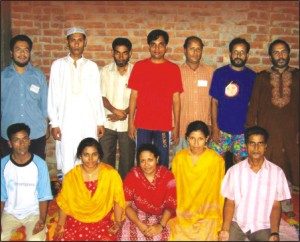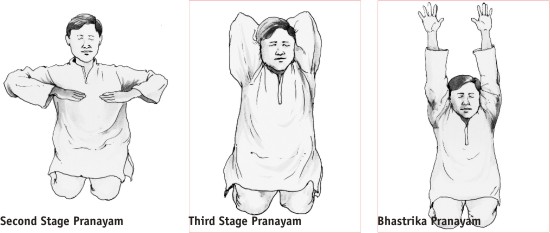| Cover Story
From Kishoreganj
Six Days in Kishoreganj
Rafi Hossain
 The city of Dhaka is actually quite small. If one drives out of Dhaka, within an hour one will start to notice great contrasts. Those of us who have been Dhaka-dwellers all our lives, we tend to think of ourselves as pretty 'fast', as though we are well tuned with the pace of the world. But when one journeys outside of Dhaka, it is easy to notice that Dhaka is not so fast after all, it is just like the rest of Bangladesh. All of Bangladesh, is a small town, a mafassal. The city of Dhaka is actually quite small. If one drives out of Dhaka, within an hour one will start to notice great contrasts. Those of us who have been Dhaka-dwellers all our lives, we tend to think of ourselves as pretty 'fast', as though we are well tuned with the pace of the world. But when one journeys outside of Dhaka, it is easy to notice that Dhaka is not so fast after all, it is just like the rest of Bangladesh. All of Bangladesh, is a small town, a mafassal. This was not my first visit to Kishoreganj on behalf of The Daily Star. I had visited this district before. But since this time I was staying for a longer stretch of time than I had before, this time it felt a little different. This time around I felt like I understood the people and the place a little better than before. Part of my responsibility was to visit local schools and colleges in Kishoreganj as part of The Daily Star Reader's Club. The good thing about these district schools is that there are still open spaces there, big playgrounds and open hallways, something that is extremely rare in Dhaka. Many of them have a very rich culture and history. They have stories worth telling. There are many established people both in and out of Bangladesh who have passed out of these zilla schools and colleges. Many of these schools have much history behind their birth and evolution. However, even though they were proud and well-reputed institutions at some time, they have become less stable over the years. They are now fraught with problems. Many of these schools lack the resources they need to function well. Many are in need of renovation or repair work. Some schools simply stand with large buildings but do not have the quality teachers and other resources required for a good school.
 |
First Stage Pranayam |
Over the years, the desire to study has increased among students. Along with this, the number of private schools has also increased. However, even though they have increased in number, there has not been a qualitative increase. They still lack good schools. One other positive thing noticeable is the presence of girls in these schools. There is a visible increase in the number of girls who want to get educated. During one such visit, at first I was a little shocked. All the girls were clad in burkhas. At first I wondered if had wandered into a madrassah. Later I noticed that in more or less all the places I visited, the majority of girls were wearing burkhas. Although I am not against burkhas, this is a personal matter, some questions rose in my mind. Are burkhas really suited to our weather? Is it practical? Is it the only way to observe purda, just to cover oneself with cloth? Is our regular dress not modest? I do not mean to say that I am against this sort of attire, but amidst these burkha-clad girls, I couldn't help asking myself these questions. Of course, that they have taken the step towards education at all is very commendable. Girls still have to struggle to get educated. But that question was gnawing at me, was Bangladesh veering towards becoming a burkha-clad society?
Usually on my visits to these districts, I become free after the visits to the schools and colleges. I have my evenings wide open. So this time around, I had decided that I would like to try teaching the Art of Living course which I am affiliated with. I also knew that it would become quite difficult in these areas, since even in Dhaka city it was hard to convince people of the merits of the course. With the help of some interested people, about 30 locals, I arranged my first class on the first day. On the second day the number dropped to 15. Nevertheless, the 15 who remained, both men and women, were genuinely and wholeheartedly interested in the benefits of the course. Two of the participants were unable to continue due to a family tragedy. What pleased me was that both genders were interested in the course. The other thing that pleased me was that they had come despite having some conservative backgrounds. Some of them suffered from some ideological misgivings. They battled their own personal beliefs while doing the course. Ultimately they gave the course their full commitment and were all very satisfied.
Many of these people had no prior knowledge of what pranayama, meditation or yoga. Despite having no idea about these things, they had a deep interest in learning. Once they did learn, they loved it. People of these areas have less hang-ups that people from urban areas about work, about earning and so on. They are more willing to learn with no strings attached. They very enthusiastically learnt pranayama, meditation and yoga.
Ranju Ahmed, a principal of a primary school, said that this course had opened a new window for him. At one point he was thinking that his life was quite drab and he was not deriving any pleasure out of anything. After doing this course, he felt that he found a new reason to live; he found a new meaning in life. He is extremely happy with the course and wants to move forward in this line.
Sheikh Selim Kabir is a cultural activist. He has no fixed profession but he is busy all the time. He helps other people as much as he can. He is unmarried and is not the typical family-man or careerist. After doing the course he decided that he also wants to continue with it and take it further.
AKM Zahirul Islam Faruk was in civil service all his life but now he has retired and wants to take his life to other directions. He did the course at a time in his life when he wanted to do something different, and his perspective on life has changed after this course, for the better. He was haunted with the question of what the meaning of life was, and now he feels that through this line, he can find his answer.
Shahidul Islam, Deen Islam, Shahedul Islam, Jinna, Mustafa Hassan, Kohinur Akhtar, Shornali Akhtar Lovely, Mir Sohel, Mukta and Moniruzzaman were all highly pleased with the course and want to spread the positive effects of this course in Kishoreganj. They would not have understood the benefits of the course had they not participated. It has given them much more physical and mental wellbeing.
An outfit or an appearance cannot be a person's identity. One also cannot be judged by one's appearance. In my journeys into different districts, I felt that there was plenty of enthusiasm among Bangladeshi people even in the face of adversity. They want proper guidelines. Capable leaders are necessary. I think we should not just do Dhaka-centric thinking but spread our knowledge into other districts. We can get plenty of skilled manpower that way, and they will positively contribute to the betterment of our society. No matter what faith they are from, they need guidelines to make them more productive.

Copyright
(R) thedailystar.net 2007 |
|
